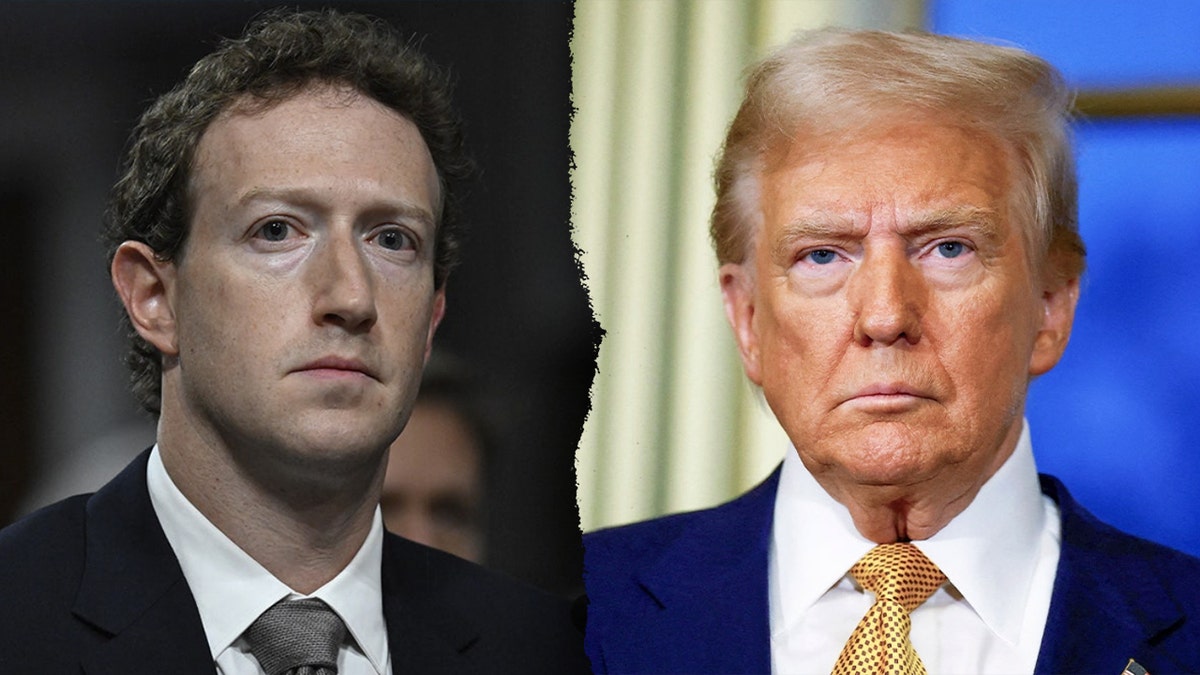The Zuckerberg-Trump Dynamic: Implications For Social Media

Table of Contents
Background: Mark Zuckerberg, the CEO of Facebook (now Meta), helms one of the world's most influential social media platforms, shaping how billions consume information and engage politically. Donald Trump, the 45th President of the United States, leveraged social media, particularly Facebook, to build a massive following and directly engage with his supporters, bypassing traditional media gatekeepers. Their intertwined narratives form a pivotal moment in the evolution of social media and its influence on global politics.
Trump's Use of Facebook and its Impact
Amplifying Political Messages
Donald Trump masterfully utilized Facebook to reach a massive audience, employing sophisticated strategies to amplify his political messages and connect directly with voters. His campaign's success on Facebook is a testament to the platform's power in shaping public opinion.
- Targeted advertising: Trump's campaign effectively used Facebook's targeted advertising capabilities to reach specific demographic groups with tailored messaging, maximizing engagement and minimizing wasted ad spend.
- Direct engagement: Trump frequently posted directly to his Facebook page, bypassing traditional media filters and fostering a sense of direct communication with his supporters.
- Successful campaigns: The 2016 presidential campaign saw significant use of Facebook to spread his message, highlighting the platform’s impact on voter turnout and engagement in a way rarely seen before. Examples include the effective use of emotionally charged imagery and concise, memorable slogans.
The Spread of Misinformation and Disinformation
Facebook's role in the spread of misinformation and disinformation during the Trump presidency is a significant point of contention. The platform's algorithms, designed to maximize engagement, inadvertently amplified false or misleading information, impacting public opinion and contributing to political polarization.
- Examples of misinformation: The spread of unsubstantiated claims, conspiracy theories, and outright falsehoods on Facebook significantly impacted public discourse during this era. Specific examples include claims about the 2020 election being stolen, and the spread of conspiracy theories related to COVID-19.
- Facebook's response: Facebook faced criticism for its slow and often inadequate response to the spread of misinformation, highlighting the challenges of content moderation on such a large platform. The lack of consistent and timely fact-checking mechanisms allowed false narratives to proliferate.
- Impact on public opinion: The constant bombardment of misinformation on Facebook created an environment where it became difficult to distinguish between truth and falsehood, impacting the public's ability to make informed decisions.
Facebook's Content Moderation Policies and Trump's Bans
The January 6th Capitol Attack and Subsequent Actions
The January 6th, 2021, attack on the US Capitol served as a watershed moment, leading to the suspension of Donald Trump from Facebook and other major social media platforms. This decision highlighted the growing tension between free speech principles and the responsibility of platforms to prevent violence and the spread of misinformation.
- Timeline of events: The events surrounding the Capitol attack and the subsequent decisions by Facebook to suspend Trump's accounts are a crucial part of this narrative. The timing and reasoning behind Facebook's actions need to be examined critically.
- Facebook's statement justifying the ban: Facebook's public statements regarding the ban provided justification based on concerns about the potential for incitement of violence and the spread of disinformation. This sparked a considerable debate regarding the company’s power and responsibility.
- Public reaction: The ban elicited strong reactions from both supporters and opponents of Trump, highlighting the deep divisions within society and the complex challenges of content moderation in a politically charged environment.
The Debate on Free Speech vs. Platform Responsibility
The Zuckerberg-Trump dynamic ignited an intense debate on the balance between free speech and platform responsibility. The question of whether social media companies should censor content, and if so, under what circumstances, remains highly contentious.
- Arguments for censorship: Proponents of censorship argue that social media platforms have a responsibility to prevent the spread of misinformation, hate speech, and content that incites violence. They argue that inaction can lead to real-world harm.
- Arguments against censorship: Opponents of censorship emphasize the importance of free speech and argue that social media companies should not act as arbiters of truth. They contend that censorship can stifle dissent and lead to biased information environments.
- The role of algorithms: The algorithmic amplification of certain types of content plays a significant role in this debate. Biases within algorithms can unintentionally favor certain narratives, further complicating the issue.
Long-Term Implications for Social Media Regulation
Increased Scrutiny of Social Media Companies
The Zuckerberg-Trump dynamic has led to increased scrutiny of social media companies, prompting calls for greater regulation and transparency. Governments worldwide are increasingly examining the power and influence of these platforms.
- Examples of government regulation attempts: Various governments have explored or implemented regulations aimed at controlling the spread of misinformation, enhancing data privacy, and increasing platform accountability.
- Calls for increased accountability: There are growing calls for social media companies to be more transparent about their algorithms, content moderation policies, and the impact of their platforms on society.
- Impact on social media business models: Increased regulation could significantly alter the business models of social media companies, potentially impacting their profitability and growth.
The Future of Political Discourse on Social Media
The future of political discourse on social media remains uncertain in light of the Zuckerberg-Trump dynamic. The events of the past few years have forced a re-evaluation of how these platforms can be used responsibly.
- Potential changes in platform policies: Social media companies are likely to implement further changes to their content moderation policies and algorithms in response to the increased scrutiny and pressure.
- The role of fact-checking initiatives: Fact-checking initiatives are becoming increasingly important in combating the spread of misinformation. However, their effectiveness and impact remain subjects of ongoing debate.
- Impact on future elections: The Zuckerberg-Trump dynamic highlights the critical role social media will play in future elections. Understanding the potential for manipulation and misinformation is essential for maintaining election integrity.
Conclusion: The Zuckerberg-Trump Dynamic: Lasting Impacts and a Call to Action
The Zuckerberg-Trump dynamic has had a profound and lasting impact on social media, raising critical questions about platform responsibility, free speech, and the spread of misinformation. Trump's masterful use of Facebook to amplify his messages, coupled with the platform's struggles with content moderation, led to significant consequences, including the January 6th Capitol attack. The subsequent debates about censorship and platform accountability have highlighted the urgent need for increased regulation and transparency.
The future of political discourse on social media hinges on addressing these challenges. We must engage in ongoing discussions about the role of social media in politics, the implications of algorithms, and the balance between free speech and platform responsibility. We encourage you to research current legislation regarding social media regulation, contact your representatives to express your views, and stay informed about the evolving social media implications of this dynamic. The future of our online spaces depends on our collective engagement and thoughtful action.

Featured Posts
-
 Understanding Pasifika Sipoti April 4th Report
May 01, 2025
Understanding Pasifika Sipoti April 4th Report
May 01, 2025 -
 Eurovision 2025 Analyzing The Leading Candidates Weeks Before The Contest
May 01, 2025
Eurovision 2025 Analyzing The Leading Candidates Weeks Before The Contest
May 01, 2025 -
 Four Dead Children Among Victims In After School Camp Car Crash
May 01, 2025
Four Dead Children Among Victims In After School Camp Car Crash
May 01, 2025 -
 Understanding The 9 Differences Target Starbucks Vs Independent Cafes
May 01, 2025
Understanding The 9 Differences Target Starbucks Vs Independent Cafes
May 01, 2025 -
 Kampen Start Kort Geding Tegen Enexis Stroomnetaansluiting In Geschil
May 01, 2025
Kampen Start Kort Geding Tegen Enexis Stroomnetaansluiting In Geschil
May 01, 2025
